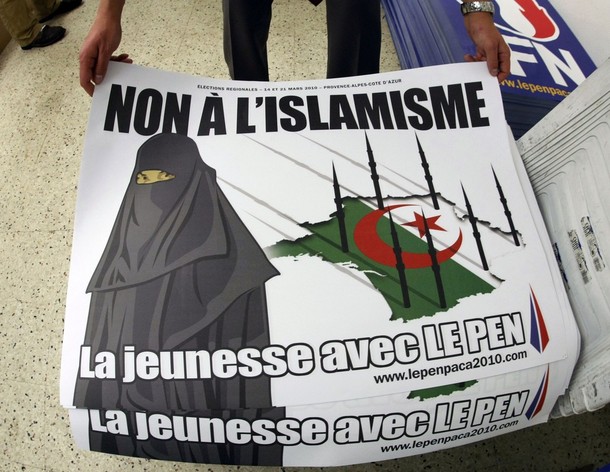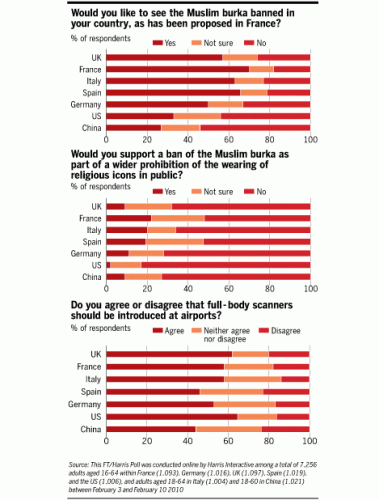
As France goes ahead with its ban on the wearing of the burqa, a new FT-Harris poll shows majority support for doing the same in the UK, Italy, Spain, and Germany — and strong opposition in the United States.
More than half of voters in four other major European states back a push by France’s Nicolas Sarkozy to ban women from wearing the burka, according to an opinion poll for the Financial Times.
As Mr Sarkozy presses ahead with plans to ban the wearing of the burka in public places, the FT’s latest Harris poll shows the move is not just strongly supported in France, but wins enthusiastic backing in the UK, Italy, Spain and Germany.
The poll shows some 70 per cent of respondents in France said they supported plans to forbid the wearing of the garment which covers the female body from head to toe. There was similar sentiment in Spain and Italy, where 65 per cent and 63 per cent respectively favoured a ban
The strength of feeling in the UK and Germany may seem particularly surprising. Britain has a strong liberal tradition that respects an individual’s right to full expression of religious views. But here, some 57 per cent of people still favoured a ban. In Germany, which is also reluctant to clamp down in minority rights, some 50 per cent favoured a ban.
“This poll shows that the number of people in France opposed to the burka is going up and that is the product of debate on burka and national identity,” said Professor Patrick Weil, an expert on national identity at the University of Paris-Sorbonne. “But the figure is clearly going up in other countries in Europe like the UK as well, and that reflects the growing concern that there is about this issue in some parts of Europe.”
In the US, concerns about the issue are far less strong than in Europe. Just 33 per cent of Americans surveyed by Harris supported a ban, a far lower figure than the 44 per cent who said they supported [sic] it.
In Europe, while opposition to the burka was strong, few respondents said they were prepared to support the ban as part of a wider drive towards secularism in their country.
Asked if they would support the burka ban if it were accompanied by a clampdown on wearing all religious icons such as the Christian crucifix and the Jewish cappel, only 22 per cent of French people said they supported such a move. In Britain, just 9 per cent of people said they would back such a move.
So, the sentiment is seemingly a specific reaction to the unique symbol that the burka represents, rather than a sign of growing anti-Islamic sentiment. Still, it’s remarkable that we’re seeing such strong support for limiting religious expression in the key states of Western Europe while Americans remain so adamant in opposition.
Aside from Americans tending to be more leery of government regulation than our European cousins, I suspect this is also a function of Americans being more religious and therefore tolerant of open symbols of worship. Indeed, the editorial board of the Christian Science Monitor is vehement in its condemnation.
French authorities say that only about 1,900 women wear the burqa or the niqab, two versions of the full covering with a mesh or slit for the eyes. That’s .038 percent of France’s Muslim population of about 5 million that’s now deemed a threat to the French Republic and its values.
The burqa does not fit comfortably with Western sentiments. It’s closed; Westerners are open. They want to see people’s faces. It’s also viewed as a prison for women – even if Muslim women are free to choose it. And it symbolizes fundamentalist Islam, which conjures up images of terrorism. That’s perhaps why the Dutch and Austrians are also discussing a burqa ban.
But sentiments shouldn’t be confused with bedrock freedoms, including the right to practice one’s religion. Being uncomfortable with another’s faith or even dress – and encoding that discomfort in law – puts one on the slippery slope to official discrimination. Will Sikh turbans be next?
But It’s startling to see something like this blithely passed into law in France — and widely supported among our other allies — when it’s unthinkable to us. But, despite common ancestry, United States culture is at odds with that of our Western cousins on a variety of issues ranging from guns to capital punishment to religious expression.
James Joyner is managing editor of the Atlantic Council. Photo: Reuters Pictures.
Image: burqa-ban-france-campaign-poster.jpg

